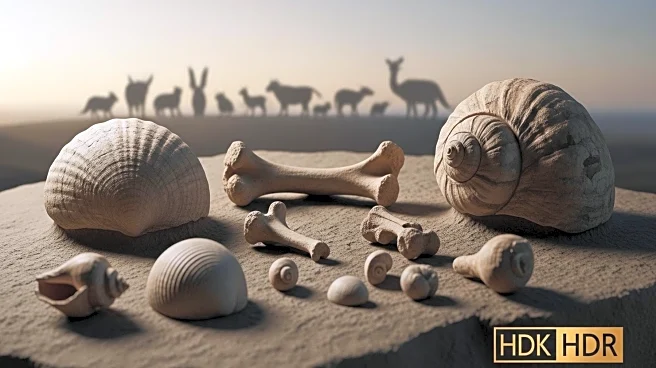What's Happening?
A study led by the University of Lausanne has uncovered the reasons why some animals are preserved as fossils while others are not. The research focused on the chemical processes that occur around animal carcasses, which determine whether they are preserved or decay. The study involved placing four aquatic animals—a shrimp, a snail, a starfish, and a planarian flatworm—into sealed jars of oxygenated water to observe the oxidation-reduction potential (ORP) above each carcass. The results showed that different animals create unique microenvironments that influence their preservation. Shrimp and snails, for example, created conditions favorable for mineralization, while planarians did not. This research provides insight into why certain animals, such as large arthropods, are more likely to be found as fossils compared to smaller organisms.
Why It's Important?
The findings of this study have significant implications for understanding the fossil record and the preservation of ancient life. By revealing the chemical processes that lead to fossilization, scientists can better interpret the fossil record, which is often incomplete and biased towards certain types of organisms. This research helps explain why fossil communities from the Cambrian and Ordovician periods are dominated by arthropods. The study also highlights the importance of body size and composition in determining an organism's likelihood of being preserved as a fossil. This knowledge can aid paleontologists in reconstructing ancient ecosystems and understanding the evolutionary history of life on Earth.
What's Next?
Future research may focus on exploring how different environmental conditions, such as temperature and salinity, affect the fossilization process. Additionally, scientists may investigate how these findings can be applied to other types of organisms and environments. The study's insights could also be used to improve methods for preserving modern specimens for scientific study. As researchers continue to uncover the complexities of fossilization, they may develop new techniques for identifying and analyzing fossils, leading to a more comprehensive understanding of Earth's history.
Beyond the Headlines
The study's findings also raise questions about the ethical implications of fossil collection and preservation. As scientists gain a deeper understanding of the fossilization process, they may need to consider the impact of their work on natural environments and the preservation of biodiversity. Additionally, the research highlights the importance of interdisciplinary collaboration in advancing scientific knowledge, as it combines elements of chemistry, biology, and geology to address complex questions about the past.










